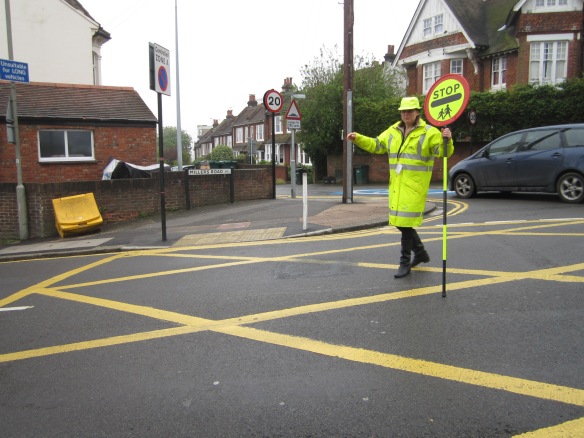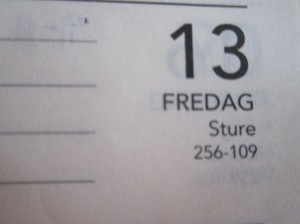 I didn't go to school myself during the project, but I walked kids to school and also picked them up in the afternoon. In England there are loads of "lollipop ladies" stopping the traffic and making sure the kids can cross safely. When I went to school in Sweden the older pupils had to take on the job as traffic wardens. I even think we got paid for it.
I didn't go to school myself during the project, but I walked kids to school and also picked them up in the afternoon. In England there are loads of "lollipop ladies" stopping the traffic and making sure the kids can cross safely. When I went to school in Sweden the older pupils had to take on the job as traffic wardens. I even think we got paid for it.
It's good up until secondary school and then I think it's bad.
The best school I went to was a private school even though I'm not into privatising.
I don't think you should have ratings, too much pressure early on in life. Social contexts play a big role where you end up.
When I went to school it was very good for me, but it doesn't look like that today. I went to a school in the countryside where the pupils loved their school and their teacher.
It's obsolete to learn things by heart, for example in what year something happened. Now when we have the Internet it's totally out.
There's so much control and it's not control that one should have.
It feels like pupils don't feel well. You forget what motivates people to learn.
Good, many good teachers, good curriculum, many good people within the school. You know how hard people work.
I think we are a bit lazy in Sweden actually. Many other European countries have much tougher schools, but other countries don't get further in the working life anyway.
There aren't enough resources. More staff is needed, more adults when you think about the school environment. The teachers have to take so much responsibility apart from the actual teaching.
It should be totally state run. The school system doesn't get better by having more private schools. But you should be able to make choices. People should do what they are good at. Private schools are all about money, it becomes a class question.
The level is higher now. It's hard to get help for the kids who need help. Too big classes. Already from pre-school things are evaluated. Social skills didn't exist when I was little.
It becomes a class questions if you want to change schools.
You should think about all the ducks in the pond, the ones who want to swim by the shore should be able to do that and the ones who want to use their wings should be able to that as well. If you can't cope with a 80 minutes maths lesson you should be able to find another way.
It's too uniform and not enough pressure from the teachers.
I learned very little at school, but I'm sure school is more interesting now, yo can make history more exciting for example. Internet for one thing.
Kids don't get the chance to develop their talents.
Free education is a good idea. And even home education.
They are prisons for children. If I had children I would home educate them. The school system supports bullying. Schools are dangerous places.
The school system is quite bad in the way they focus on measuring everything and are obsessed about evaluating even small children.
Children seem to have less general basic knowledge. And the insularity in England is a big problem compared to other countries.
To be tied in is the biggest problem. I would rather go travelling and read books by my own.
I'm happy with the education system, but it's suffering from the cuts.
Education should be a right - not a privilege.
It puts a lot of pressure on young people. You're locked in from an young age, all the testing and different grades.
It's really good. People moan a lot, but it's better now. But I don't like it that you have to pay for everything.
I'm delusioned with the school system that's why I want to home educate my kids. Children enter into formal school too early, it's not child led.
I didn't like school, didn't see the point. The teachers didn't deal with bullying.
It was good when it came to degree level, but I came out of school not understanding how to do maths. But it's better now. My daughter is miles better than I was.
Our generation would benefit form doing more hands on, like craft activities.
My thoughts
In England children start school when they are four years old. In Sweden when they are six. In England the children have to wear uniform and call their teachers Mr and Mrs and Miss. In Sweden you can wear whatever you like and call your teachers by first name. In England the schools are surrounded by fences and have locked gates, in Sweden they are usually open. So perhaps it's not so strange that some people in England referred to school as a prison and feeling locked in. A few preferred home education. But I don't think it's that much stricter in England compared to Sweden. The schools I've visited (when doing poetry projects) have been pretty lively.
It's funny that only Swedes mentioned the class question. Personally, I think it's because the class differences between schools is part of everyday life in England (which I experienced when staying with people and have written about in the book), but it's just recently that the class differences have become visible in Sweden due to privatising and cuts. A lof of the people with young kids were worried about picking the right school.
Before I thought that IF I against all odds have children, I would not want them to go to an English school. I wanted them to grow up in Sweden and go to a Swedish school because I knew how it all worked. How narrow-minded of me. I don't know how it works in Sweden anymore. There are 24 years since I started school. It's easy to say it was better in the past. I think that a lot of things have become more fun and modern, but at the same time it's scary that the class question has become such a big issue. Both when it comes to private schools and the size of the actual classes!
Question 11a was about university education and then people were more positive.
This study is by no means scientific, the answers are based on interviewing 15 people in England and 15 people in Sweden, aged 22-59. Look out for the next question: Where do you see yourself in one, five and ten years time?




